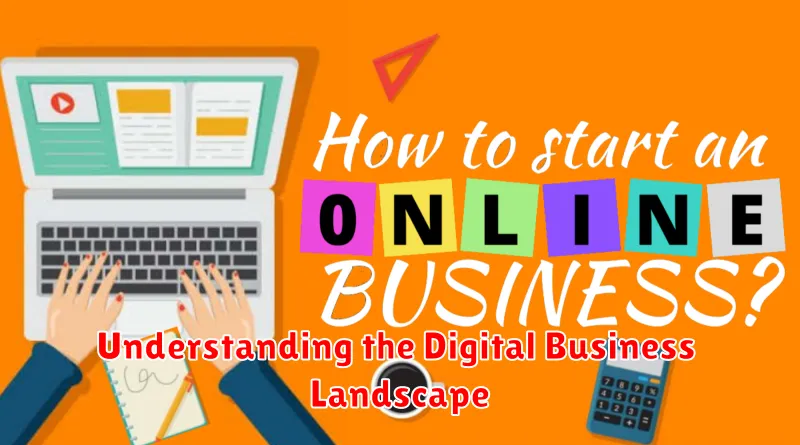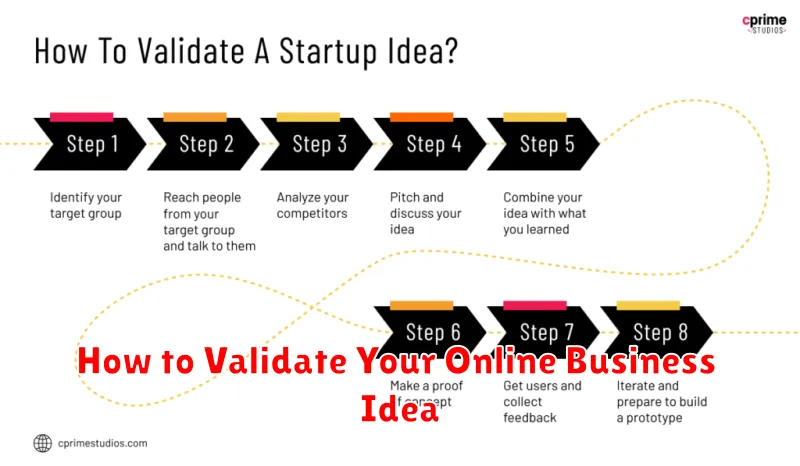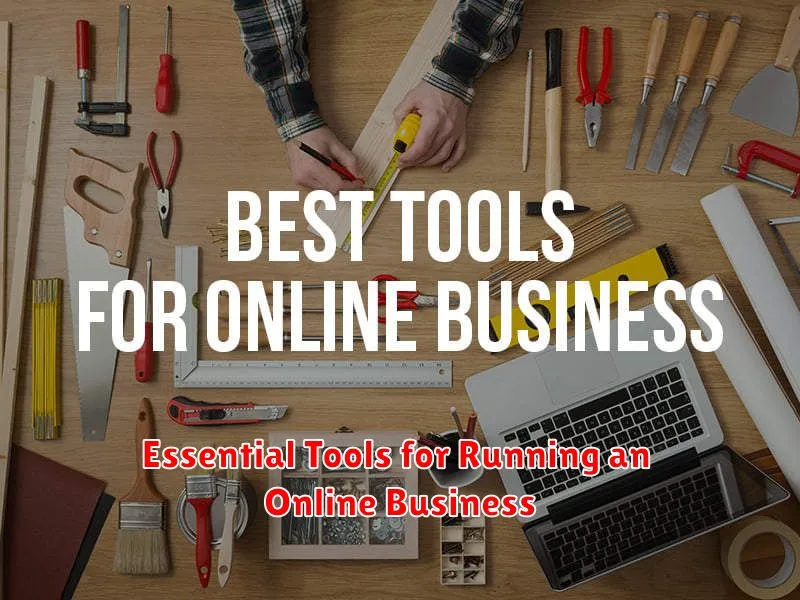Starting an online business can be incredibly rewarding, but it requires careful planning and execution. This comprehensive guide, Online Business 101: How to Start and Succeed, will walk you through every crucial step, from identifying a profitable niche and creating a winning business plan to mastering digital marketing and building a loyal customer base. Learn how to navigate the complexities of e-commerce, manage your finances effectively, and ultimately achieve sustainable online business growth. Discover the secrets to online business success and turn your entrepreneurial dreams into a thriving reality.
Understanding the Digital Business Landscape

The digital business landscape is incredibly dynamic, characterized by constant evolution and intense competition. Understanding this landscape is crucial for online business success.
Key aspects include the prevalence of e-commerce platforms, the rise of social media marketing, the importance of search engine optimization (SEO), and the increasing reliance on data analytics for informed decision-making.
Competition is fierce, with businesses of all sizes vying for customer attention. Differentiation through unique value propositions, excellent customer service, and strong branding is essential for standing out.
The technological advancements are rapid; businesses must be adaptable and embrace new technologies to remain competitive. This includes staying current with mobile optimization, emerging platforms, and cybersecurity best practices.
Finally, legal and ethical considerations are paramount. Understanding data privacy regulations, consumer protection laws, and intellectual property rights is vital for long-term sustainability and avoiding legal issues.
Choosing the Right Niche and Business Model
Selecting a profitable niche is crucial for online business success. Consider your passions, skills, and market demand. Research keywords and analyze competitor offerings to identify underserved areas with potential for growth. Focus on a niche specific enough to target effectively, yet broad enough to sustain your business.
Choosing the right business model is equally important. Popular options include e-commerce (selling physical or digital products), affiliate marketing (promoting others’ products), subscription services (recurring revenue streams), and service-based businesses (offering expertise). The optimal model aligns with your niche, resources, and long-term goals. Thoroughly evaluate each option’s profitability, scalability, and market fit before committing.
Careful consideration of both niche and business model will significantly increase your chances of building a sustainable and successful online business. The key is finding the perfect intersection between your interests and market opportunities.
How to Validate Your Online Business Idea

Before investing significant time and resources into your online business, validation is crucial. This ensures your idea resonates with your target market and has a real chance of success. There are several key steps to follow.
First, conduct thorough market research. Identify your target audience, analyze competitor offerings, and understand the existing demand for your product or service. Utilize tools like Google Trends and social media listening to gauge interest levels.
Next, create a Minimum Viable Product (MVP). This is a simplified version of your product or service, allowing you to test core features and gather feedback early on. It doesn’t need to be perfect; its purpose is to test the market’s response.
Gather feedback from potential customers through surveys, interviews, and beta testing. Analyze this feedback to identify areas for improvement and refine your offering before launching fully. Pay close attention to any recurring pain points or unmet needs that your product/service could address.
Finally, analyze your results. Did your MVP generate interest? Did customers find value in your offering? Were there any significant challenges or unexpected findings? Use this data to adjust your business plan accordingly, ensuring a stronger foundation for growth.
By rigorously validating your idea, you significantly increase your chances of creating a successful and sustainable online business.
Setting Up Your Website and Branding
Establishing a strong online presence is crucial for any online business. This involves two key components: setting up your website and developing your brand.
Your website serves as your digital storefront. It needs to be user-friendly, visually appealing, and easily navigable. Consider using a platform like WordPress or Shopify, depending on your technical skills and business needs. Ensure your website is optimized for mobile devices and includes clear calls to action.
Branding encompasses your company’s visual identity and overall message. It’s about creating a consistent and memorable experience for your customers. This includes your logo, color palette, fonts, and overall tone of voice. A strong brand helps you stand out from competitors and build customer loyalty. Develop a brand style guide to ensure consistency across all platforms.
Consider professional help if needed. Investing in a well-designed website and a cohesive brand identity can significantly impact your business’s success. Think about your target audience when making these decisions – ensuring your website and brand resonate with them is paramount.
Building a Solid Business Plan for Online Success
A well-structured business plan is crucial for online success. It provides a roadmap, guiding your actions and ensuring focus. This plan should clearly define your business model, outlining how you will generate revenue.
Thoroughly investigate your target market. Understanding their needs, preferences, and online behavior is essential for effective marketing and product development. Analyze your competition to identify your unique selling proposition (USP) and differentiate your offerings.
Detail your marketing strategy. Consider search engine optimization (SEO), social media marketing, paid advertising, and email marketing. Outline your budget allocation for each strategy and establish key performance indicators (KPIs) to measure success.
Develop a realistic financial projection. This includes startup costs, operating expenses, projected revenue, and profitability analysis. Secure adequate funding to support your business operations.
Finally, outline your operational plan, detailing your website development, technology infrastructure, customer service strategy, and legal considerations. Regularly review and adapt your business plan as your online business evolves and market conditions change.
Essential Tools for Running an Online Business

Successfully running an online business requires leveraging the right tools. E-commerce platforms like Shopify or WooCommerce are crucial for setting up your online store, managing inventory, and processing payments. Customer Relationship Management (CRM) software, such as Salesforce or HubSpot, helps organize customer interactions, track sales, and improve customer service.
Marketing automation tools, including Mailchimp or Constant Contact, are vital for email marketing, nurturing leads, and automating repetitive tasks. Social media management tools like Hootsuite or Buffer streamline social media posting and engagement. Analytics platforms like Google Analytics provide valuable data on website traffic, customer behavior, and marketing campaign performance, enabling data-driven decision-making. Finally, project management software such as Asana or Trello aids in organization and collaboration, crucial for managing multiple tasks and team members.
The specific tools you need will depend on your business model and industry. However, investing in these essential categories will significantly improve efficiency and contribute to the overall success of your online venture. Careful selection and effective utilization of these tools are key to maximizing your online business potential.
How to Launch with Minimal Investment
Starting an online business doesn’t require a large upfront investment. Freelancing is an excellent option, leveraging existing skills in writing, design, or programming to offer services on platforms like Upwork or Fiverr. This requires minimal initial outlay beyond creating a professional profile.
Dropshipping allows you to sell products online without holding inventory. You partner with a supplier who handles storage and shipping, minimizing your risk and startup costs. The initial investment focuses on building your online store and marketing efforts.
Affiliate marketing involves promoting other companies’ products and earning a commission on sales. This requires minimal investment, primarily focused on creating valuable content (like a blog or social media presence) to attract an audience and drive traffic to affiliate links.
Creating and selling digital products such as ebooks, online courses, or templates is another low-cost option. The primary investment lies in the creation of the product itself, with marketing and sales handled digitally.
Regardless of your chosen path, effective marketing strategies are crucial for success, even with minimal investment. Focus on organic methods like social media engagement, content marketing, and search engine optimization (SEO) to build your brand and attract customers organically. Remember that consistent effort and strategic planning are key to overcoming any financial limitations.
Common Mistakes to Avoid in Your First Year
Launching an online business is exciting, but many new entrepreneurs make avoidable mistakes during their first year. Avoiding these pitfalls can significantly impact your success.
One common error is underestimating the time commitment. Building a successful online business requires dedication and consistent effort far beyond a traditional 9-to-5 job. Proper time management and realistic expectations are crucial.
Another frequent mistake is poor marketing and insufficient customer acquisition strategies. Simply having a website isn’t enough; you need a well-defined marketing plan encompassing SEO, social media engagement, and potentially paid advertising to reach your target audience effectively.
Many new businesses also fail to track key metrics. Understanding your website traffic, conversion rates, and customer acquisition costs is essential for making data-driven decisions and improving your business performance. Regularly analyze your data to identify areas for improvement.
Finally, neglecting customer service is a critical error. Responding promptly to customer inquiries, resolving issues efficiently, and building strong customer relationships are vital for long-term success and positive word-of-mouth referrals. Prioritize excellent customer service from the outset.
By avoiding these common mistakes and focusing on building a solid foundation, you significantly increase your chances of achieving sustainable success in your first year of online business ownership.

